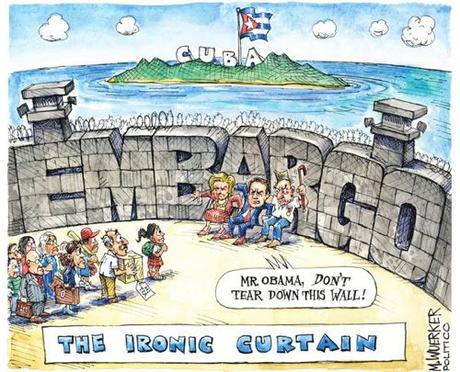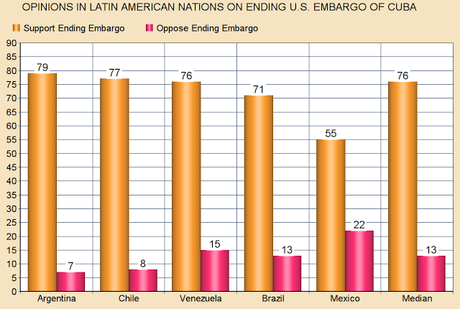 (This cartoon on Cuban embargo is by Matt Wuerker at Politico.com.)
(This cartoon on Cuban embargo is by Matt Wuerker at Politico.com.)Recently, U.S. President Barack Obama and Cuban President Raul Castro negotiated a return to normal diplomatic relations between the two countries. And last month each nation officially opened an embassy in the other country. But one thing the president did not do was end the U.S. embargo of Cuba.
That embargo has now been in effect for over 50 years. It was instituted to put economic pressure on Cuba, and force it to change their government (to one more compliant with U.S. government policies and U.S. corporate greed). To say it has not worked would be an understatement -- and the other nations of the world long ago abandoned it. They all now trade with Cuba as though the embargo did not exist. That includes the nations in this hemisphere, especially the Latin American nations.
Latin American nations have tried to convince the United States for many years to allow Cuba into the Organization of American States (OAS), and to normalize relations with Cuba. Those goals have now been accomplished. All that really remains to be done is to end the embargo on trade with Cuba.
The reason President Obama couldn't end the embargo is because that embargo was imposed by Congress -- and only Congress can remove it. Unfortunately, Congress is controlled by right-wing Republicans -- and they still think they can gain politically from continuing the embargo (especially among their xenophobic base).
Latin American nations disagree. They want the embargo to end. The Pew Research Center surveyed at least 1,000 citizens in each of five of the largest and most powerful Latin American nations, and they found huge majorities of citizens in those nations want the United States to end the embargo against Cuba. They see it as divisive and counterproductive. The results of that survey are illustrated in the chart below:


